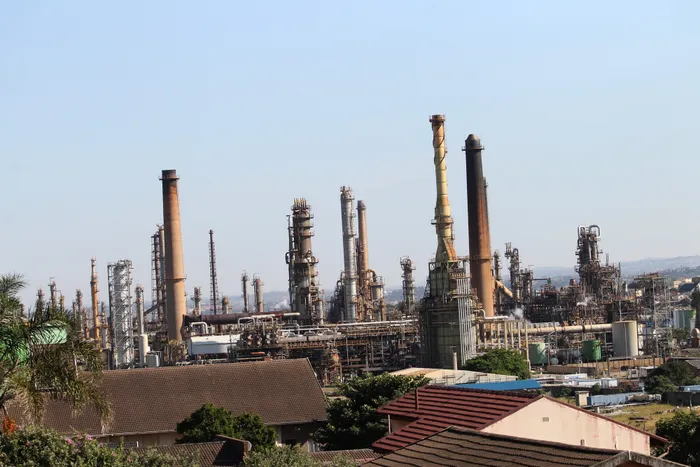South Africa’s biggest oil refinery to ‘pause’ operations for an undetermined period

South Africa - Durban - 27 May 2020 - Sapref refinery in iSipingo Picture: Doctor Ngcobo/African News Agency(ANA)
SAPREF refinery, South Africa’s biggest crude oil refinery jointly owned and operated by BP South Africa and Shell Refining South Africa said in a shock announcement yesterday, they would “pause” refinery operations from the end of March, 2022 for an indefinite period.
They did not rule out the future sale of the refinery south of eThekwini, and said a restart of operations might be possible sometime “in the future”
The imminent halting of Sapref’s operations is another massive blow to what is left of the South African crude oil refining industry, which has for years struggled with financial viability from low government-controlled profit margins, rising costs, ageing plants, power interruptions, low growth in sales, and the need for massive capital investment to produce cleaner fuels.
Engen closed its refinery in Durban in December, 2020 following an explosion and is now converting it into a fuel-storage facility. Astron Energy’s refinery in Milnerton, Cape Town, is scheduled to restart “at some point” this year, after production was halted in the middle of 2020 due to a fire. Meanwhile, the state-owned gas-to-liquid refinery in Mossel Bay was forced to issue a tender for gas in October, as its offshore gas reserves are depleted.
“Following consultations with the government, unions, and employees, Sapref shareholders today announced they will commence with a spend-freeze and pause refinery operations at Sapref no later than the end of March, 2022. This will be for an indefinite period…” their statement said.
“The decision has been taken to allow an informed finalisation on the various options available to the shareholders, a sale option being the most preferred. Until decisions about the future of the plant have been made – including a possible change of ownership – the SAPREF shareholders are unable to commit to further investment in the refinery,” it said.
The decision to pause refinery operations currently would have no impact on full-time employees, the statement said.
Alluding to the likelihood of importing fuel in the future, the shareholders said they “will use other existing assets and trading arrangements to ensure ongoing security of fuel supply to the country and their consumers”.
bpSA chief executive Taelo Mojapelo said: “Over the many decades since its establishment, Sapref has made immense economic contributions at both a local and national scale. For this reason, we continue to pursue the sale of our share in the refinery, so that it can continue to advance its legacy as a reliable, safe and productive asset.”
He said contingency measures were in place to ensure the decision to “pause” production did not impact its customer-facing businesses in South Africa or the company’s fuel-supply obligations.
“We remain committed to South Africa through our demonstrated transformation initiatives in the value chain, and continue to work with our strategic partners to strengthen our differentiated convenience offers,” Mojapelo said.
Hloniphizwe Mtolo, country chair, Shell Downstream South Africa said the decision to pause the refinery was a difficult one for both shareholders.
“South Africa continues to be a key location for Shell as we progress our growth agenda as an energy-provider of choice, and a nation-builder,” he said.
bpSA has operated in Southern Africa for over 100 years, with over 500 branded retail service stations in South Africa, and it has invested in six fuel-storage terminals.
Established in 1963, Sapref holds 35 percent of the country’s refining capacity and refines products that include petrol, diesel, jet fuel, lubricating oil, liquid petroleum gas, paraffin, solvents, bitumen, marine fuel oil and chemical feed stocks. It produces 2.7 billion litres of petrol a year, enough fuel to take 800 000 cars around the world.
BUSINESS REPORT ONLINE